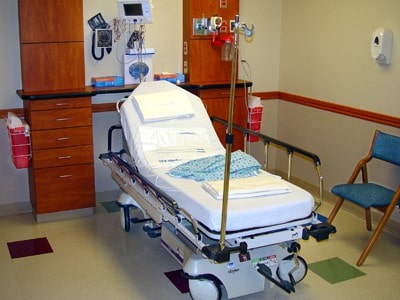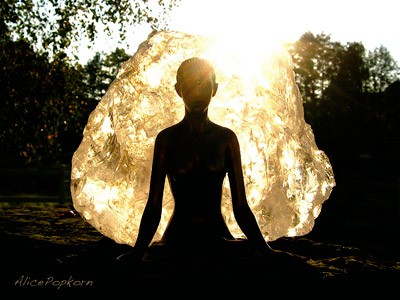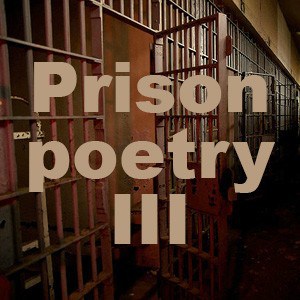Journey to the operating room and beyond
Practicing the Dharma during a surgery

Jordan is an acupuncturist. Here, he tells the story of his knee surgery and how he used his Dharma practice throughout the entire experience. His preference for minimal sedation during surgery reflects his personal choice, not a Buddhist precept.
I had knee surgery yesterday. The night before taking the bus to the hospital, I reread my courtesy letter explaining when I had to stop eating and drinking. After doing a little side research on the Internet and finding these recommendations were based on 100-year-old medical protocol, my mind tightened and groaned a bit and I began to realize I was embarking on another journey of learning, perhaps every bit as challenging as my solo journey across Central Asia to Mount Kailash.
I reread the notification that the hospital was required by law to ask about whether I had any advance health care directives. So I pulled an extra copy from my files, tossed it into my bag and walked to the bus carrying my crutches.
Painting impermanence
Soon, I was in the pre-surgery waiting area, stripping naked, putting on my gown and staring at an enchantingly beautiful seascape painting on the wall. Immediately, I recognized the scene as a place I had been to in my childhood, and it brought up a lot of happy memories. In the background, Manana Island loomed like an abstract doorway into the unknown, a black disc, like the back of a whale, silhouetted in the shimmering late afternoon Gulf of Maine summer sunshine. In the foreground, a lady sat in an outdoor wooden chair just up from the pier on Monhegan island, facing west towards the dark portal.
I thought to myself, this is an auspicious sign, a reminder of the beautiful islands—both literal and metaphorical—along the shores of my passage up the coast of life. Everything is going to go well today, I smugly mused. I waited for the nurse to return, watched my breath slowly, and studied the painting more. I then noticed the three empty chairs next to the woman. Could the artist have subtly included this as a reminder of death, of friends departed? The more I gazed into the westward glimmer, the place of our ancestors according to First People, I started to drift into dreamtime—the awareness that our past and future life is little more than a dream, and the present moment life can end in any instant. Am I ready?
When I was 10 years old, I had met a hermit on Manana Island. In my late 20s, I found the mirror image of Manana Island on the remote west coast of British Columbia and played out my own version of Henry David Thoreau for several years before returning to the pavement of Seattle. In my 30s I did this and that. Went here and there. My 40s … almost gone. Life slipping away faster than a shooting star, a bubble of dew at dawn, a candle flame in the wind.
Inside the borders of the painting, my eyes were drawn deeper into the dark island of mystery, death, and rebirth, continuing to glimmer as my breaths grew long and deep. I was in a trance. It was delicious. Then, I remembered the imminent surgery. Am I ready?
I recalled my motivation to cross the ocean of samsara in order to reach full enlightenment so that I can then be of highest service to other beings. It’s okay to dwell in fantasy land for a moment, calm the waters of the mind, but the storm is brewing and the captain needs his wits about him as the rogue seas began piling over the bow.
Facing fear and pain with clarity
Why am I here? Karma, I reminded myself. My own deluded deeds resulted in this train wreck of body and mind called “Jordan.” I, like everyone else I know, do not like pain. But I also have come to realize that by facing pain and not running away from it, one can gain powerful insight into the nature of reality—the emptiness of inherent existence as the Buddhist teachings refer to what is realized by the supreme wisdom mind.
I’m pretty comfortable with the tiny needles of acupuncture, but the bigger needles still push my fear meter to the red line. So this is my Everest, my Mount Kailash today, to breathe into the jabs, pokes, and cuts and disentangle my consciousness from its deluded fixation on being the owner of this body—as if it were a permanent thing.
I asked for no sedation, just spinal anesthesia. The surgeon—with whom I felt good rapport from the outset—told me, “not a problem.” But I had held a mistaken impression that she would act as grand communicator of my wishes to everyone on her team. In hindsight, I realized she probably doesn’t know who is going to be on her team on any given day.
The anesthesia nurse finally came back and after taking my blood pressure, she said, “Now I am going to give you your sedation.” I suppose they are used to most people saying, “Great, dope me up.” Despite my sudden surprise, given that I had made clear my wish not to receive sedation, I was alert enough to immediately say, “I prefer not to have sedatives please.”
From a Buddhist perspective, having a clear state of mind in each moment is like holding the key to inner peace and spiritual enlightenment. This is true in life, but becomes especially critical during the dying process. And though the surgery was clearly routine, death is also routine. It will happen one day. Unless one prepares for that moment, then odds are strong that emotional turmoil may prevail rather than a confident and calm clear-headedness.
Meditation on the body
My IV drip of antibiotics was started and I was wheeled into the OR. In all the times previous in my life that I had been wheeled into an OR (five), I had always been under general anesthesia. It was strange, like a dream, to be wheeled in there, to see the banks of machinery and computers, hanging from poles everywhere. I watched the nurses and docs do their pre-op ritual dance. I felt relaxed, but was also bracing myself for the big poke, silently working on the wall of fear.
Finally the moment had come. I was asked to lean forward and hunch my back. The sting of a local anesthesia wasn’t so bad, it was the deep pressure of something being forced into my spinal cord. Very strange. But it was over in a moment, and I was allowed to lie back and watch the tingling in my lower body grow. Finally, a shot of morphine into my knee, and I was ready.
I could feel my knee getting yanked into different positions that I know would have caused me pain without the anesthesia, and yet there was none. Then came odd sensations, as if someone were popping rivets off inside my knee, then the sound of a cutting tool, shaving my meniscus cartilage. I began to differentiate between the physical sensation itself and my mental response to the sensation. When the mind tightens, the body tightens. I watched this again and again, relaxing each time through my breath.
Anxiety was running a little high, but I had chosen this passage and even then, knew it was exactly where I wanted to be, on the edge of my mental comfort zone, staring up at the mountaintop of enlightenment from my tenuous hand-hold on the sheer cliff of the present moment. I was learning to disengage from the intense ego-attachment that the “I” feels for this body. This “learning to let go” is the basis for any peaceful death (and life). Surgery, from this perspective, is an opportunity to practice a dress-rehearsal for death and to be more centered in life.
Then it was over. The curtain came down and I could see my knee being wrapped in gauze. The surgeon was pleased and said I would also be pleased once I recovered from the procedure. My knee was good for another twenty years or so, she said. I was wheeled into the post-op recovery room for further observation where I overhead a nurse say that my venous system was shut down and that I was very anxious. Perhaps they forgot that I was relatively alert and not all doped up and could fully understand their conversation.
Reflections on the American medical system
Hours later, my perineum was still numb and my bladder had a liter of IV fluids in it. Unable to pee on my own, I was catheterized and helped into a wheelchair around 6:30 p.m.—six hours after the surgery. As she wheeled me towards the elevator to meet my wife, I told the nurse, “I feel very calm.” She said, “That’s because of all the drugs you have in you.” She told me that they had indeed given me anti-anxiety drugs. Not a word of this was mentioned to me as these were being slipped into my IV.
Was the administration of these drugs considered a medical necessity overriding any personal preference I would have had? I certainly would have refused if I had the option—preferring to deal with my anxiety consciously. I suspect they were given in an effort to speed up my recovery—to relax my veins and thereby increase the re-oxygenation process in my blood. I trust that my body would have recovered just fine—in its own time.
I am not afraid of being a little anxious. It’s an opportunity for me to deepen my meditation practice. How else can people learn to work with their mind if they aren’t given the opportunity to refuse mind-altering drugs instead of having them constantly pushed on them (and delivered without their consent) by the system?
It seems pretty obvious that my desire to allow my body to recover on its own, without drugs, was in conflict with the desire of the hospital staff, who were looking to go home on time and not have to hang around for a “pesky spinal” to wear off, as one nurse put it. And it’s probably less stressful to deal with doped up patients requiring less conscious interaction. If the patient’s edge of fear isn’t getting tested, then there is less chance that the nurse’s fear edge gets exposed.
And of course, there are the undeniable economic incentives built into the American medical system ensuring that pharmaceutical medications are liberally dispensed. Doctors, pharmaceutical companies, hospitals, corporate lobbyists, and Congressional lawmakers—the money goes round and round.
Gratitude for kindness
Oh, I could waste a lot of time ranting and pointing fingers, but little good would come of it. I am very fortunate: I had a good doctor who genuinely cared about people, and I wrote her a thank you letter, politely outlining my experience, offering her my reflections for her consideration.
I was able to pay for the surgery without going into debt (barely), and I lived to tell this story. Lessons learned: Always smile at my patients, give them the very best of my mind and attention. Help them avoid trips to the hospital with preventive acupuncture and wellness coaching. And when they need heroic hospital medicine, help them recover with more acupuncture.
May all beings be healthy and happy, live in virtue, die peacefully, and awaken to supreme enlightenment.


